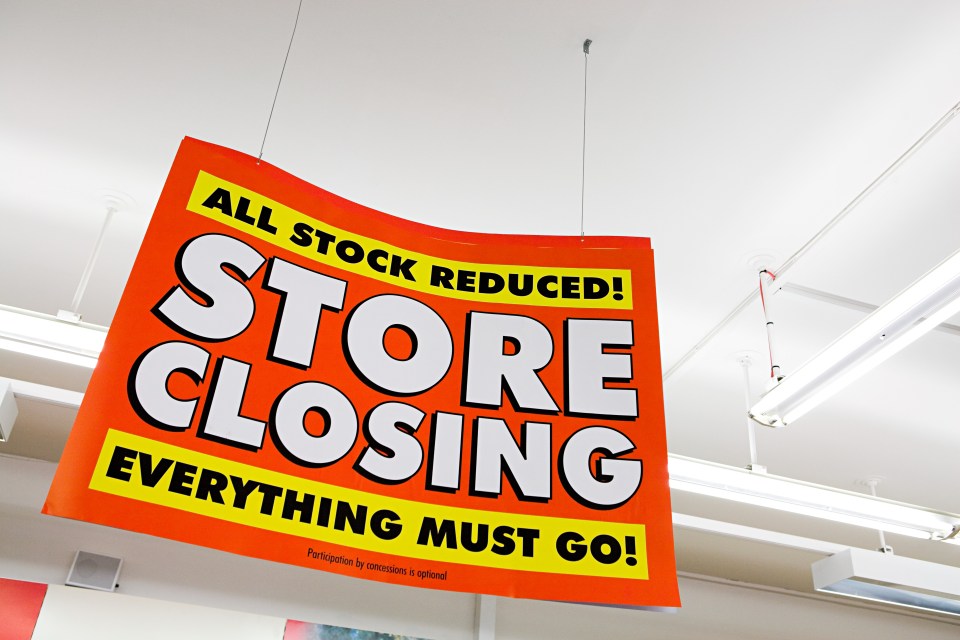All the high street retailers closing stores TODAY – including Poundland, Game and Original Factory Shop
HIGH streets across the UK are facing more closures as major retailers shut their doors today.
Poundland, Game, and The Original Factory Shop are among the chains cutting back on stores, leaving shoppers with fewer options.
These closures are part of wider restructuring plans as businesses adapt to changing shopping habits and financial pressures.
Here are all the stores shutting on your local high street today.
Game
Game is closing its Metrocentre store in Gateshead today (September 7).
The closure is part of changes by its owner, Frasers Group.
The company is reducing the number of stores as more shopping moves online and into concessions.
The chain has around 240 stores across the UK. Another store in the Galleries Shopping Centre, Bristol, will close on September 25.
However, a Game concession inside the Sports Direct store in the same shopping centre will stay open.
Both closing stores are holding big sales to clear stock.
Shoppers can get discounts of up to 20%.
Poundland
Poundland’s Pontypool store is set to close today (September 7), followed by the closure of its Irvine branch on 14th September.
Recently, discount chain avoided going into administration by getting creditors to agree to restructuring plans, which included closing stores and cutting jobs.
Poundland’s restructuring will see the chain close a total of 68 stores.
The restructure also includes rent cuts at up to 180 stores and the closure of its frozen food and online shopping.
Meanwhile, the Darton frozen food distribution centre will shut later this year.
This will mean online shopping and frozen food will no longer be offered by Poundland.
The Bilston national distribution centre is also set to close in early 2026.
Come September 16, shoppers will no longer be able to buy products online and its loyalty scheme, Poundland Perks, will be axed.
Customers who have signed up to the Poundland Perks app have until January 15, 2026, to use their reward vouchers.
But Poundland plans to expand its £1 product range and focus on womenswear and seasonal items if the restructure goes ahead.
Original Factory Shop
The Original Factory Shop has been closing stores across the UK as part of a major restructuring plan.
Branches in Kidwelly, Carmarthenshire, Normanton, West Yorkshire, and Kirkham, Lancashire, are among those that have already shut their doors.
Next in line are the Chard store, which closed today (September 7) and the Market Drayton branch, set to shut on September 20.
The Original Factory Shop was bought by Modella Capital, a private equity firm, in February.
Modella is known for taking on struggling retailers and has also recently bought Hobbycraft and WHSmith’s high street shops.
The firm quickly launched a restructuring effort to renegotiate rents at 88 The Original Factory Shop stores.
At the end of April, Modella drew up plans to initiate a company voluntary arrangement (CVA) for the retailer.
Companies often use CVAs to avoid insolvency, which could otherwise force stores to close or trigger the collapse of the entire business.
They allow firms to explore different options, such as negotiating reduced rents with landlords.
But The Original Factory Shop previously told The Press and Journal that a “number of loss-making stores would have to close” in the restructuring.
What else is happening on the high street?
Bodycare, which begun as a market stall in Lancashire back in the 1970s and has 147 UK stores, appointed administrators from Interpath Advisory on Friday.
Exactly 32 stores closed with immediate effect, with around 450 employees made redundant.
Currently, 115 stores remain open and are trading as usual while administrators explore options for the future of the business.
However, if a buyer cannot be found, further store closures may occur.
Like many of its peers, Bodycare has felt the burn of risings cost coupled with shoppers having less money to spend at the till.
Recently, River Island avoided going into administration by getting creditors to agree to restructuring plans, which included closing stores and cutting jobs.
River Island will close up to 33 stores in January to help write off the fashion brand’s debts.
Locations in major UK cities including Edinburgh, Leeds, Oxford, Brighton and Perth are all expected to close.
Meanwhile, fashion retailer New Look has closed a dozen sites in the UK this year and also exited Ireland.
Last month, Claire’s also collapsed into administration and stopped online orders for its customers.
Plus, H&M-owned fashion chain Monki closed the last of its high street stores in August.
Retail pain in 2025
The British Retail Consortium has predicted that the Treasury’s hike to employer NICs will cost the retail sector £2.3billion.
The Centre for Retail Research (CRR) has also warned that around 17,350 retail sites are expected to shut down this year.
It comes on the back of a tough 2024 when 13,000 shops closed their doors for good, already a 28% increase on the previous year.
Professor Joshua Bamfield, director of the CRR said: “The results for 2024 show that although the outcomes for store closures overall were not as poor as in either 2020 or 2022, they are still disconcerting, with worse set to come in 2025.”
Professor Bamfield has also warned of a bleak outlook for 2025, predicting that as many as 202,000 jobs could be lost in the sector.
“By increasing both the costs of running stores and the costs on each consumer’s household it is highly likely that we will see retail job losses eclipse the height of the pandemic in 2020.”


